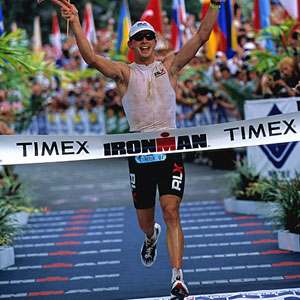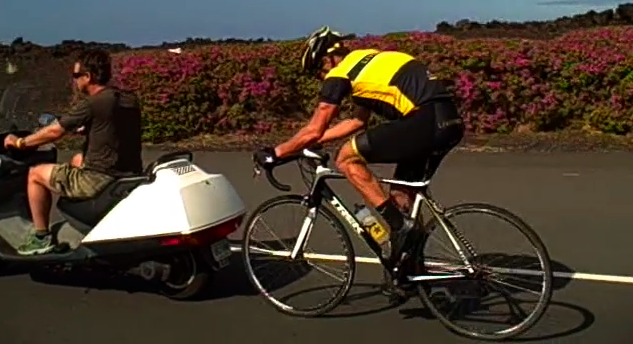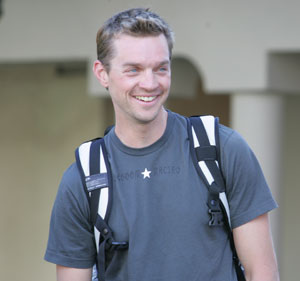DeBoom, Stadler, Whitfield join Alexander on the CTS bandwagon
The 2008-2009 off season had a goodly share of high profile athlete-coach musical chairs. Ironman dominatrix Chrissie Wellington and fellow squad mates Hillary Biscay and Belinda Granger left Brett Sutton to form a new squad with Samantha McGlone’s husband and coach Cliff English. When that deal evaporated, Wellington signed on with Simon Lessing. Joining Sutton’s crew was Wellington’s CO2 cartridge savior Rebekah Keat.
But then came the really big ones.
After those initial splashes, the tsunami in the triathlon coaching world was the news that two-time Ironman Hawaii champions Tim DeBoom (pictured, winning at Kona in 2001) and Normann Stadler, and Olympic gold and silver medalist Simon Whitfield would follow in the footsteps of 2006 Ironman 70.3 World Champion and 2008 Ironman World Champion Craig Alexander to train under the guidance of Carmichael Training Systems. Giving even more resonance to the news was the fact that Alexander, DeBoom and Stadler were all among the smartest athletes in a complex sport, outliers and loners who have achieved Hall of Fame success while coaching themselves for the peaks of their careers.

While Carmichael achieved intense fame as the coach of Lance Armstrong from cancer survivor to 7-time Tour de France champion, in the same time frame Carmichael created coaching juggernaut CTS in Colorado Springs that has grown to 50 employees coaching perhaps a thousand athletes at all levels in a multitude of sports. In the past few years since Armstrong’s retirement and before his resurrection this year, CTS could brag about training athletes in wildly different sports including table tennis, cross country skiing, field hockey, mixed martial arts, long distance kayaking and yacht racing. With Armstrong off dating Sheryl Crow, running marathons, and promoting LiveStrong and the fight against cancer, CTS press releases didn’t have quite the buzz promoting excellent but not-so-headline-grabbing athletes like US Cyclocross star Katie Compton, back flipping NASCAR stud Carl Edwards, and a range of top age group athletes like 45-49 star Michael Hagen and top-10 ultra runners.
As CTS grew, it approached in size established top organizations like Joe Friel’s Training Bible Coaching. CTS’s celebrity buzz started to return when Craig Alexander, one of the most thoroughly professional and meticulously prepared stars in the triathlon firmament, signed on with CTS a few months before taking on his first Ironman Hawaii in 2007. After Crowie bagged a well-executed second place in his Kona debut, the partnership with CTS solidified as Alexander offered several tributes to Carmichael and Alexander’s personal CTS coach Nick White. When Alexander summited the Everest of the Ironman world last October, the momentum of his success helped carry DeBoom, Stadler and Whitfield into the fold.
In terms of star power, triathlon became Carmichael’s second leading calling card after Lance. Which, given Carmichael’s baptism by fire coaching elite triathletes, is almost as big a comeback as Armstrong’s. Just after Carmichael founded CTS in 1999, 1998 Ironman Hawaii champion Peter Reid signed up with Carmichael to improve his already excellent cycling. While working with Carmichael, Reid won Kona in 2000 and Carmichael temporarily basked in the sunshine. But soon thereafter, Reid went into a tailspin, and failed to finish the 2001 Ironman Hawaii, and cut ties with Carmichael.
“I really enjoyed working with Peter, but Peter said I overtrained him and burned him out,” said Carmichael. In retrospect, Carmichael says that he worked with Reid on cycling, while Reid continued to work with another coach for swimming and running. Failure to integrate the three triathlon disciplines drained Reid’s energy systems and led to a career-threatening meltdown.
Happily, Reid emerged from that hole to take second at Kona in 2002, and a big win in 2003. Happily for Carmichael, DeBoom and Whitfield, who were friends with Reid during his struggles, saw the bigger picture of what Carmichael Training Systems had to offer, illuminated by Alexander’s success.
Now, DeBoom is 37, Stadler is 36, Alexander is 35, and Whitfield is going on 34. If there is one thread that connects them besides success, it is that all of them are entering the autumn of their careers. Each of them has a smaller margin of error that used to be overcome by the bountiful energy and brilliance of youth. With the Ironman fields getting deeper in quality, all of them are drawn to the resources of the Carmichael system and want to take advantage of stage of the art technical expertise to get the details right.
And while CTS’s tri-stars may look like the sport’s version of the New York Yankees on paper, there is equal amounts of risk and reward at stake. While DeBoom and Stadler have come to CTS to take away the guesswork and help them avoid a recent history of injuries and sickness, if things go wrong with proven stars, it will be another well-publicized failure.



